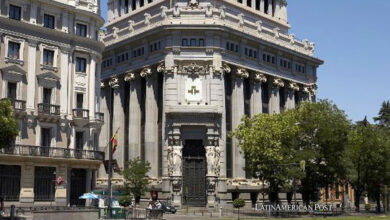Why does Franco’s exhumation cause such a stir in Spain?
The possibility of removing the dictator's body from its resting place has caused debate

The Spanish government, led by the socialist Pedro Sánchez, will exhume the remains of Francisco Franco. The dictator is buried in the Valley of the Fallen, a Catholic basilica, 60 kilometers north-west of Madrid, since his death in 1975.
The decision has caused a great debate in Spanish society, as many still support the anticommunist and national-Catholic legacy of Franco, while others criticize him for being undemocratic and causing crimes against humanity.
The controversy
On June 17, the secretary of Justice and New Rights of the PSOE, Andrés Perelló, said that "the apology of Franco and fascism will be banned to match the more established European democracies, because a nation demonstrates its decency when it treats well their dead, and we have a historical debt to the dead and their families". Doing the exhumation is part of that effort.
The same president Pedro Sanchez said, in July, to the Congress of Deputies: "the wounds have been open for many years, too many, and the time has come to close them. Our democracy will have symbols that unite the citizenship".
However, the Popular Party (or PP) of more conservative ideals are against the initiative of the government of the exhumation. In fact, since the approval of the Law of Historical Memory in 2007, the PP has reduced funding for the construction of memory around the Civil War and the Franco regime, especially after its victory in the 2011 elections, led by Mariano Rajoy
Likewise, the current secretary general of the PP, Pablo Casado, has stated that he "would not spend a single euro" on unearthing the general. Last July, he described the government plan as "a fracture" for Spanish society.
The Latin American dictators
What it is necessary to understand is how entrenched the Francoism is in contemporary Spanish society. Some see the Francoist legacy as exemplary, while others see it as a barbarian. The construction of historical memory is fundamental to consider the effects of conflict in all sectors of society. Knowing that, we should ask if there are similar cases in Latin America, whose history is rich in dictators that divide current societies.
Also read: Politicians and sex scandals: A more frequent combination?
- Bolivia: In the case of Hugo Bánzer, dictator of Bolivia during 1971 to 1978 and who later was elected president between 1997 and 2001, he had a public funeral and was presided by four presidents at that time. There were even 30 days of national mourning.
- Chile: the ashes of Augusto Pinochet are in the private home of his family. However, at the time of his death in 2006, thousands of people accompanied his funeral, while thousands more celebrated his death in public streets, causing clashes.
- Argentina: The Argentine dictator Jorge Videla was going to be buried in his hometown, Mercedes, but the neighbors opposed, remembering the 22 missing people of the city during his government. At the end, he was secretly buried, as well as his successor, Roberto Viola, who had a funeral without incident. Nor were there during the funeral of Leopoldo Galtieri, who did have a public ceremony.
- Colombia: Gustavo Rojas Pinilla, dictator in Colombia between 1953 and 1957, was veiled in the National Capitol of Bogotá and buried in the Central Cemetery of that city.
- Panama: Manuel Antonio Noriega, former Panamanian dictator, did not have a public funeral and his ashes were given to his wife.
- Cuba: Fulgencio Batista, who ran Cuba until 1959, fled to Spain and died there, being buried with his second wife and one of his children.
Who was Francisco Franco?
The figure of Francisco Franco is central in the history of the 20th century in Spain. He was a military who led a coup in 1936 against the Republican government and his side was the victor of the Spanish Civil War. Until 1975, he was dictator of his country and promoter of a national identity in accordance with the Catholic religion and conservatism, in addition to assimilating it with a fascist government and, by extension, anti-Communist.
During the Civil War in Spain, the Franco regime was accused of crimes against humanity that include slavery, enforced disappearance, political repression, assassinations, and political and social repression, among many others. This has caused great national criticism because it is a crushing of democratic and liberal values.
On the other hand, the result of the war and the years of the dictatorship meant for an important sector of the Spanish population the defense of Catholicism, deeply connected with the Spanish identity. At the same time, there was a fight against communism, which was on the rise in Europe. Basically, the Spanish society was fractured thanks to the events of the Civil War and the dictatorship.
For example, the current government party (Socialist Party or PSOE) is the main promoter of the exhumation of Franco from the Valley of the Fallen through a reform to the law of Historical Memory of 2007. The law, which seeks to build memory of the conflict through public funds, is problematic because it does not recognize the social importance of the victims of Francoism, relegating its commemoration to the private and not public.
LatinAmerican Post | Iván Parada Hernández
Translated from “¿Por qué la exhumación de Franco causa tanto revuelo en España?”





